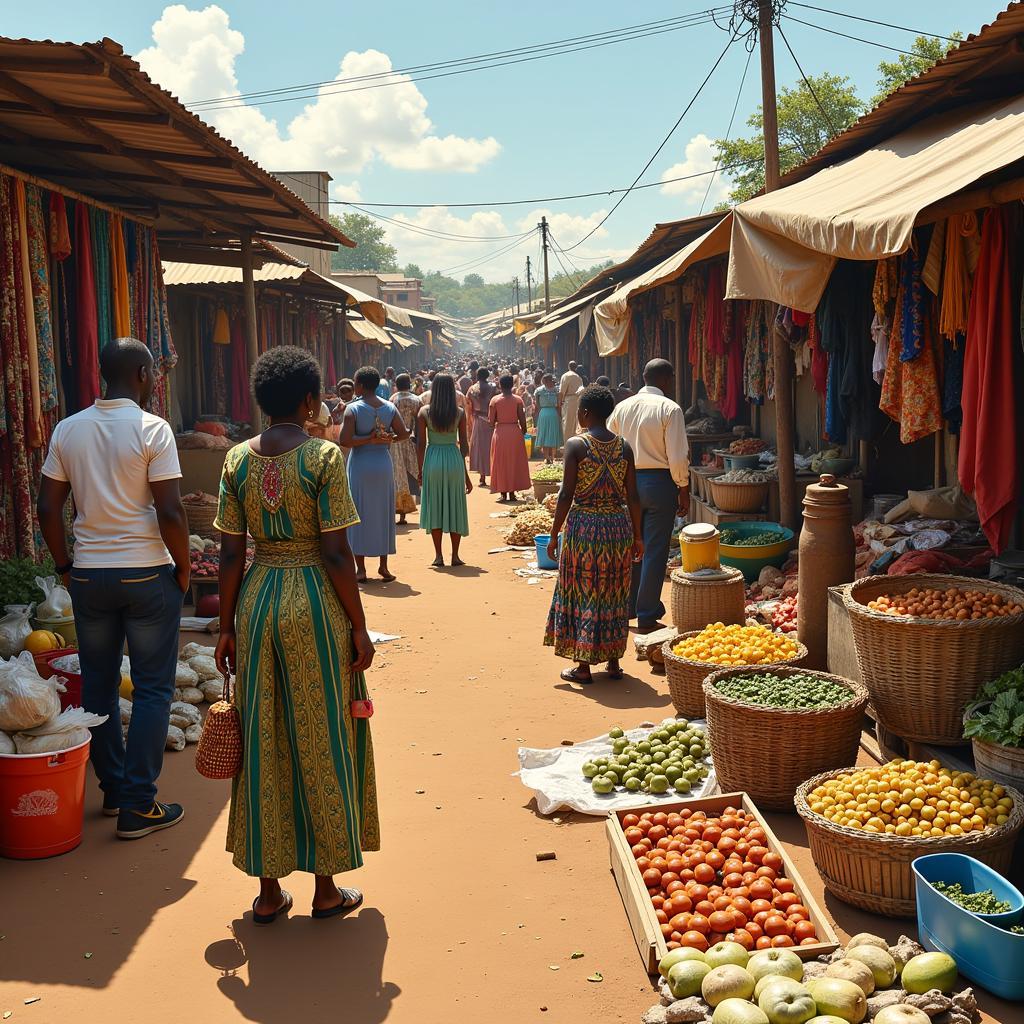Engaging African Games for the Classroom
African Games For The Classroom offer a vibrant and interactive way to introduce students to the rich culture and history of the African continent. These games go beyond simple entertainment, providing valuable learning experiences that foster cultural understanding, critical thinking, and teamwork. From traditional board games like Mancala to energetic activities like Ampe, incorporating African games into your curriculum can create a dynamic and engaging learning environment.
Children across Africa, much like children everywhere, find joy in play. Games are a vital part of their upbringing, teaching valuable lessons and skills while fostering a sense of community and belonging. By exploring African games for the classroom, educators can tap into this rich tradition and provide students with a unique and enriching learning experience. For instance, games can be used to teach mathematical concepts, improve strategic thinking, and enhance language skills. They can also serve as a platform to discuss cultural diversity and promote respect for different traditions. More than just fun activities, these games offer a window into the lives and cultures of people across Africa. What’s even more exciting is how easily these games can be adapted for the classroom, making learning fun and engaging for students of all ages. Want to know more about 7 years african boy?
Exploring Traditional African Board Games
Traditional African board games, like Mancala, offer an excellent way to introduce mathematical concepts and strategic thinking. Mancala, known by various names across Africa, is a game of strategy involving counting and capturing seeds. This seemingly simple game requires players to plan ahead, anticipate their opponent’s moves, and adapt their strategies accordingly. It’s a fantastic way to develop critical thinking skills in a fun and engaging way. Other board games, such as Bao, which is popular in East Africa, also offer similar learning opportunities, further demonstrating the educational value of traditional African games.
Energetic and Active African Games for the Classroom
Beyond board games, numerous energetic and active African games can be adapted for the classroom setting. Ampe, a popular game in Ghana, is a great example. This game involves jumping and clapping, promoting physical activity while also teaching rhythm and coordination. It’s a fantastic way to get students moving and energized while learning about a different culture. Similar games like Nyama Nyoka, a snake-inspired game from Zimbabwe, also encourage movement and teamwork, adding an element of fun and excitement to the learning process. These active games not only provide physical benefits but also foster social interaction and cooperation among students. Do you know about african animal riddles?
Incorporating Storytelling and Riddles into African Games
Storytelling and riddles are integral components of many African cultures, and they can be seamlessly incorporated into classroom games. For instance, riddles based on African animals or folklore can be used as clues in scavenger hunts or treasure hunts, adding an element of mystery and intrigue to the game. This approach not only enhances the fun factor but also introduces students to the rich oral traditions of Africa. By weaving stories and riddles into the game, educators can create immersive learning experiences that captivate students’ imaginations and deepen their understanding of African cultures.
Adapting African Games for Different Age Groups
African games for the classroom can be adapted for different age groups, ensuring that the activities are appropriate and engaging for all students. For younger children, simpler versions of Mancala or other board games can be introduced, focusing on basic counting and turn-taking skills. For older students, more complex games with strategic elements can be used, challenging them to think critically and develop problem-solving skills. Similarly, active games can be modified to suit different age groups, ensuring that all students can participate and enjoy the experience. You might also be interested in african kids 6 years old.
Creating a Culturally Sensitive Learning Environment with African Games
When incorporating African games into the classroom, it’s crucial to create a culturally sensitive learning environment. Educators should research the origins and significance of the games they choose, ensuring that they are presented respectfully and accurately. It’s also important to avoid stereotypes and generalizations, emphasizing the diversity of cultures and traditions across the African continent. By fostering a respectful and inclusive learning environment, educators can ensure that African games are used as a tool to promote cultural understanding and appreciation. Interested in african city crossword?
In conclusion, African games for the classroom provide a unique and engaging way to introduce students to the rich culture and history of Africa. From traditional board games to energetic activities, these games offer valuable learning opportunities that go beyond simple entertainment. By incorporating these games into your curriculum, you can create a dynamic and enriching learning environment that fosters cultural understanding, critical thinking, and teamwork.
FAQ
-
What are some popular African board games?
- Mancala, Bao, and Oware are popular African board games.
-
How can African games be adapted for younger children?
- Simplify rules and focus on basic skills like counting and turn-taking.
-
Why is cultural sensitivity important when using African games in the classroom?
- It ensures respect for diverse cultures and avoids harmful stereotypes.
-
How can African games enhance learning?
- They promote critical thinking, teamwork, and cultural understanding.
-
Where can I find resources for African games?
- Online resources, libraries, and cultural centers can provide information.
-
Are there active African games suitable for the classroom?
- Yes, games like Ampe and Nyama Nyoka encourage movement and coordination.
-
How can storytelling be incorporated into African games?
- Riddles and folktales can be used as clues or prompts within games.
For further information about drumming, check out african drumming workshops for schools.
Need help incorporating African games into your curriculum? Contact us! Phone: +255768904061, Email: kaka.mag@gmail.com or visit us at Mbarali DC Mawindi, Kangaga, Tanzania. Our 24/7 customer service team is ready to assist you.


